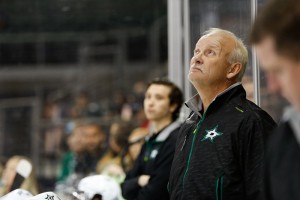“Our best players were our best players tonight.”
“Our best players weren’t our best players tonight.”
Those two catchphrases are used by coaches across the NHL to explain, in the simplest possible terms, wins and losses. Dallas Stars head coach Lindy Ruff is no exception. In fact, he uttered the former phrase following the Stars’ 6-2 victory over the Anaheim Ducks Tuesday night.

Statistics back up the coach’s postgame statement. To use just one player as an example, Dallas captain Jamie Benn tallied one goal and two assists on the night. The captain put up identical numbers in last Thursday’s 5-2 defeat of the Nashville Predators.
Benn is an elite player in the world’s top hockey league, so those three-point performances come as no great surprise. What might raise eyebrows, however, is his ice time in those games: 16:37 and 17:56, respectively. Considering he currently leads Stars forwards in average time on ice at exactly 20 minutes per game, the totals for the Anaheim and Nashville games were on the low side.
Looking at this up-and-down, Jekyll-and-Hyde, frustrating season as a whole, the Stars are 3-9-3 when Benn plays over 20 minutes and 9-4-3 when he stays under that mark. On the surface, it makes no sense. Shouldn’t the Stars win more when their best players play more? If not, does that mean that less Jamie Benn might be more? THW turned to Coach Ruff for answers.
Ruff Explains Ice Time, Team Performance
When THW pointed out the aforementioned statistics and asked if, in order for the Stars’ best players to be their best players, they needed to play less, Ruff replied, “There’s a lot of thought that goes into that. There’s also the thought that in those games we’re losing, you tend to try to get your best players out there more to help you win.”
The coach continued, saying, “In these games where we’re leading big, it’s easy to back off your better players and keep the ice time down. The Nashville game, we had a big lead, we ended up with a big lead, so during the third period, we really shut ‘em down, didn’t play ‘em that much anymore.”

That’s the simple answer. In his response to a previous question, however, Ruff talked about the grind of this season’s compressed schedule. Teams around the league, Dallas included, are feeling the effects. Fatigue, both physical and mental, are causing players to make mistakes, he said. THW referenced the coach’s comments on fatigue, and he addressed the issue.
“I think, with the schedule, you’ve made a really good point.” Ruff said. “You know, you go to the Colorado game. It was a game where I really tried to pay attention to shorter shifts and keeping the ice time between four lines, not worrying about matching, just, ‘let’s make sure we always have fresh guys on the ice.’ And I think that has taken some toll. You’ve made a good point that maybe with the way the schedule is, those guys aren’t good 20-minute guys. Maybe their number is better at 16, 17.”
The Stars’ schedule lightens up next week, due in part to the three-day Christmas break. After the holiday, the every-other-day grind resumes. The grind intensifies in January, when Dallas must run a gauntlet of eight games in 13 days, including two back-to-backs. Considering Ruff’s comments and the road ahead, Stars fans might see Jamie Benn a little less in the coming days and months. That might actually be a good thing.